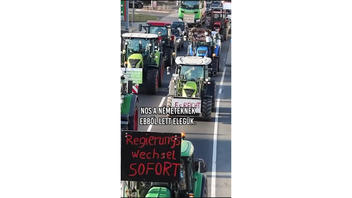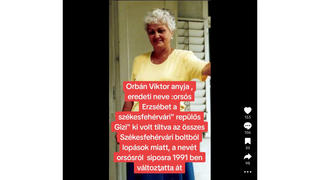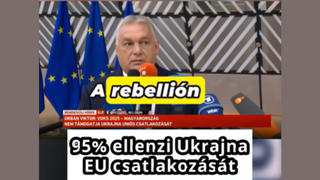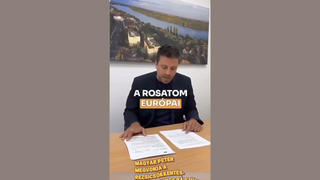
A német gazdák tényleg azért "dühösek", mert kormányuk pénzügyi támogatást nyújt az orosz támadás ellen védekező Ukrajnának, és azért, mert az Európai Unió az olcsó ukrán gabona-exportokat beengedi piacaira? Nem, ez nem igaz: A közúti forgalmat akadályozó német gazdákat inkább a kormány tervezett agrártámogatás-csökkentése és adópolitikája idegesíti, nem pedig az Ukrajnával kapcsolatos politikája. Sőt, egy közvélemény-kutatás azt mutatja, hogy a németek többsége vagy egyetért a kormány által Ukrajnának nyújtott pénzügyi segély mértékével, vagy úgy gondolja, hogy még nagyobb támogatást kellene biztosítania.
Az állítás egy TikTok videóban (archiválva itt) jelent meg 2024. január 11-én a "Németország bemutatja: így jár az a kormány, amelynek az ukránok fontosabbak, mint a saját népe!" címmel. A bejegyzést Deák Dániel tette közzé, aki partnerként tevékenykedik a magyar kormányt közösségi média tartalmakkal támogató Megafon Központnál. Deák a következőt mondja:
Tudjátok, hogy valójában miért dühösek a németek? Hogy miért vannak a gazda-tüntetések? A német politikusok az elmúlt időben többet beszéltek Ukrajnáról, mint a saját hazájukról. A német gazdaság tönkretétele árán is támogatták fegyverekkel és pénzzel Ukrajnát... Nem érdekelte [a berlini kormányt] az sem, hogy az ukrán gabona tönkretette az uniós és a német gazdákat... Őket csak egyvalami érdekelte: hogy minél több pénzt és fegyvert tudjanak betolni Ukrajnába, és hogy az amerikai gazdáik elégedettek legyenek.
A bejegyzés így nézett ki a TikTokon e cikk megírásakor:
(Forrás: TikTok képernyőmentés. Készült 2024. január 16., kedd 12:27:22 UTC)
A Reuters szerint a német gazdák százai érkeztek 2023. december 18-án Berlinbe, hogy követeljék Olaf Scholz kancellártól a dízel-támogatások csökkentésére és a mezőgazdasági járművek adókedvezményeinek eltörlésére vonatkozó terveinek visszavonását (itt archiválva). A Reuters másik beszámolója szerint a kormány beleegyezett abba, hogy enyhítse a megszorításokat a gázolaj-támogatás csökkentésének három évre történő fokozatos bevezetésével, valamint az új mezőgazdasági járművek kedvezményes adójának fenntartásával (itt archiválva). A gazdák ennek ellenére tovább folytatták a tüntetéseket, 2024. január 15-én traktorok és teherautók konvojai állították le a forgalmat a német főváros környékén - írja a Reuters (archiválva itt).
A gazdák sehol sem említik komoly sérelemként az EU piacait elárasztó ukrán gabonát vagy az Ukrajnának nyújtott állami támogatást. Egy 2024. január 17-én végzett Google-keresés (archivált itt) a "Bauernproteste" ("gazdatüntetés"), "Getreide" (gabona) és "Ukraine" német kulcsszavakra 2023. december 18-ig visszamenőleg nem talált semmit sem, amely összekötné Ukrajnát a német utakon tapasztalható fennakadásokkal.
A Német Gazdák Szövetsége (DBV) honlapján 2024. január 17-én végzett keresés az "Ukrajna" szóra (archiválva itt) azt mutatta, hogy az iparág vezetői tisztában vannak azzal, hogy az ukrán gabona túlkínálata nyomást gyakorol az árakra. Azonban azt is tudják, hogy ezt részben ellensúlyozza a világ más részein megnövekedett kereslet. A DBV a következőt írta egy 2024. január 2-án megjelent piaci jelentésben (a Google Translate fordítása németről, itt archiválva):
A továbbra is magas ukrán exportvolumen, valamint a rendkívül jó oroszországi búzatermés és az ebből eredő magas exportvolumen lehúzza a világpiaci árat. Ez azonban nem homályosíthatja el azt a tényt, hogy a búza és a kukorica globális ellátási mérlege továbbra is szoros, éppen az USA átlag alatti kukorica termése miatt... Még Kína, mint nagy gabonaimportőr, fekete dobozt [meghatározhatatlan jelenséget] képez. 2024-re megbízható kilátások aligha lehetségesek a bizonytalan globális helyzet miatt.
Igaz, hogy a Scholz-kormány megszorító intézkedéseivel eredetileg mintegy 900 millió eurót (358,6 milliárd forintot) próbált spórolni a német gazdálkodókon, a Reuters szerint (archiválva itt), miközben több mint 27,8 milliárd eurót (11,1 ezer milliárd forintot) különített el Ukrajna háborús erőfeszítéseinek megsegítésére, a Német Szövetségi Külügyminisztérium 2023. december 22-i közleménye szerint (archiválva itt).
Az ARD-DeutschlandTrend 2024. január 4-én közzétett közvélemény-kutatása (archiválva itt) azonban azt mutatja, hogy a németek 52 százaléka vagy "megfelelőnek" tartja Németország Ukrajnának nyújtott segítségének a szintjét, vagy úgy gondolja, hogy az nem elég. A közvélemény-kutatás szerint a válaszadók 41 százaléka szerint az összeg "túl sok".
A TikTok videóban szereplő állítás a magyar kormány ukrán gabonaimport miatti aggodalmait (archiválva itt) és az Ukrajnának nyújtott katonai segélyekkel szembeni határozott ellenállását (archiválva itt) összekeveri a német gazdák panaszaival. A magyar kormány a 2023-as Nemzeti Konzultációban "háborúpártinak" nevezte az EU-tagországok álláspontját amiatt, hogy Németországhoz hasonlóan fegyverekkel látják el Ukrajnát (archiválva itt).












